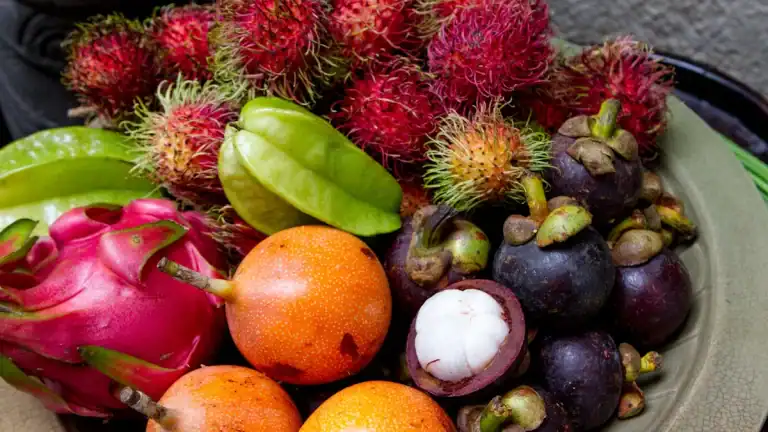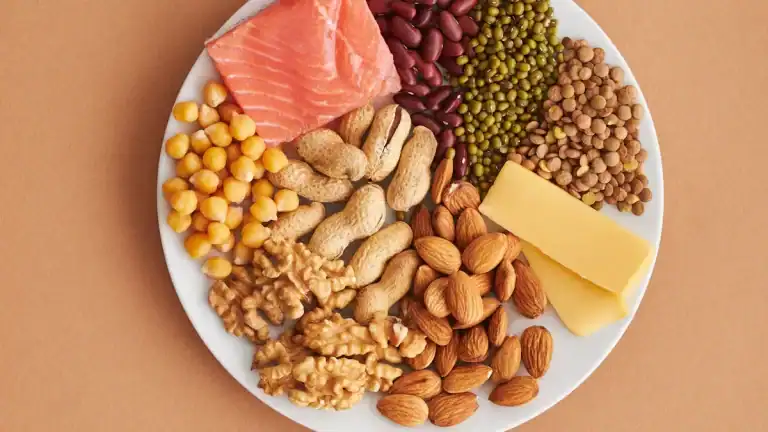
Folate, also known as Vitamin B9, is a vital nutrient your body needs. This essential nutrient supports cell division and DNA synthesis. Folate also plays a crucial role in maintaining one-carbon metabolism. This folate helps with DNA replication, repair, and methylation. For pregnant women, folate is especially critical. It supports maternal tissue growth during pregnancy. Folate helps prevent neural tube defects. Understanding foods high in folate and its many benefits is key for your overall folate and health. Knowing good sources of folate helps you maintain optimal health.
Key Takeaways
Folate, or Vitamin B9, is a very important nutrient. It helps your body make new cells and DNA.
You can find folate in many foods. These include leafy greens, beans, fruits, nuts, and some animal products.
Folate is especially important for pregnant women. It helps prevent serious birth defects in babies.
Getting enough folate helps your heart and brain stay healthy. It also helps make healthy red blood cells.
Not getting enough folate can make you tired and cause other health problems. Too much folic acid can also be harmful, so talk to your doctor.
What Is Folate: Essential Vitamin B9
Defining Folate And Its Functions
Folate, also known as Vitamin B9, is a crucial water-soluble vitamin. You need folate for many vital body processes. Chemically, folate is quite intricate. It consists of three main parts: a methylated pteridine ring, p-aminobenzoic acid (PABA), and glutamic acid. These components link together in a specific way. The pteridine ring attaches to PABA, which then connects to glutamic acid. This unique structure is fundamental to how folate works in your body. Your body converts dietary folate into its active coenzyme form, tetrahydrofolate (FH4). This conversion involves adding electrons and hydrogens to the pteridine ring. Folate molecules can also have several glutamic acid residues, typically ranging from three to seven. This complex structure allows folate to perform its essential roles. Folate plays a key role in cell growth and DNA synthesis. It also helps with DNA repair and methylation processes. These functions are critical for maintaining healthy cells throughout your body.
Why Folate Is Crucial
You cannot overlook the importance of folate. This vitamin is essential for creating new cells every day. It helps your body make and repair DNA, the genetic material in all your cells. Without enough folate, your cells cannot divide properly. This impacts many bodily functions, from your blood to your brain. For example, folate is vital for producing healthy red blood cells. It supports rapid cell division, which is especially important during periods of growth, like pregnancy or childhood. Folate also helps convert a substance called homocysteine into other harmless substances. High levels of homocysteine can be detrimental to your health. Therefore, adequate folate intake protects your overall well-being. You need sufficient folate every day to keep your body functioning optimally and to support these fundamental biological processes.
Foods High In Folate: Sources of Folate
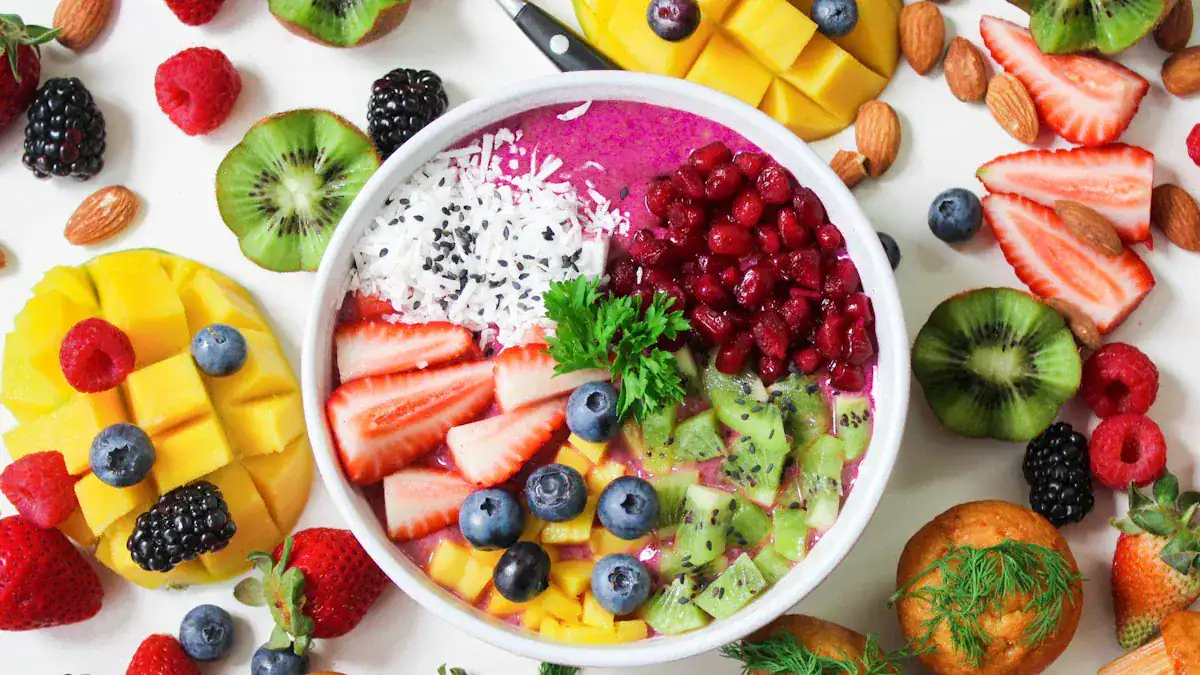
You can find folate in many delicious foods. Knowing these sources of folate helps you plan your meals. Eating a variety of these foods high in folate ensures you get enough of this important nutrient.
Dark Leafy Greens
Dark leafy greens are excellent sources of folate. You should include them often in your diet.
Spinach: This leafy green is a powerhouse of nutrients. Raw spinach contains a good amount of folate. For example, 100 grams of raw spinach gives you about 191.8 micrograms (µg) of folate. Another study shows raw spinach has 226 micrograms (µg) of folate per 100 grams. You can add spinach to salads, smoothies, or cook it lightly.
Asparagus: These green spears are not only tasty but also rich in folate. Steam or roast asparagus for a healthy side dish.
Broccoli: This cruciferous vegetable offers many health benefits, including a good dose of folate. You can enjoy broccoli steamed, roasted, or in stir-fries.
Brussels Sprouts: These small, cabbage-like vegetables are another great option. They provide significant folate and other vitamins.
Legumes and Beans
Legumes and beans are fantastic plant-based sources of folate. They are versatile and easy to add to many dishes.
Lentils: Cooked lentils are especially rich in folate. A cup of cooked lentils (192g) provides 392µg of folate. This means 100 grams of cooked lentils contain approximately 204.17µg of folate.
Edamame: These young soybeans are a delicious snack or addition to salads. They offer a good amount of folate.
Beans: Many types of beans are packed with folate. Cooked black beans, for instance, contain 256 micrograms (mcg) of folate per 100 grams. Other beans like kidney beans and pinto beans also contribute to your folate intake.
Peas: Green peas are small but mighty. They provide folate and other essential nutrients.
Fruits
Certain fruits can also boost your folate levels. Make sure to include these in your daily fruit servings.
Oranges: Fresh oranges are a refreshing way to get folate. You get about 30 micrograms (µg) of folate from 100 grams of fresh oranges.
Bananas: This popular fruit offers a moderate amount of folate. It is also a good source of potassium.
Melons: Cantaloupe and honeydew melons contain some folate. They are hydrating and sweet.
Papayas: The folate content in papaya can vary. Different varieties and growing conditions affect it.
Papaya Variety
Total Folate Content (µg/100 g)
(1)
90.7 ± 1.24
Formosa (2)
61.6 ± 3.01
Papaya Pulp (1)
90.8 ± 1.91
Papaya Pulp (Formosa 2)
56.3 ± 1.48
Papaya Seeds (1)
41.2 ± 1.79
Papaya Seeds (Formosa 2)
25.6 ± 5.91
The amount of folate in papaya can differ. Some studies show 11.0 µg/100 g and 23.0 µg/100 g. The USDA database lists 37.0 µg/100 g. These differences happen due to various testing methods and where the papayas grew.
Citrus Fruits: Other citrus fruits like grapefruits and lemons also contain some folate.
Nuts and Seeds
Nuts and seeds are convenient and healthy foods high in folate. You can snack on them or add them to meals.
Sunflower Seeds: These seeds are a great source of folate. Sunflower seeds contain approximately 227 mcg of folate per 100 grams. Dried sunflower seed kernels provide 105 mcg DFE of folate per 100 grams.
Peanuts: Peanuts are another excellent choice for folate. According to Foodstruct.com, 100 grams of peanuts contain 240 micrograms (µg) of folate. Spartan Nutrition also states that 100 grams of peanuts provide 240 micrograms (mcg) of folate.
Raw or Sprouted Seeds and Nuts: Sprouting can sometimes increase nutrient availability. Include a variety of raw or sprouted seeds and nuts for a good high folate intake.
Animal-Based Sources
While many plant-based foods high in folate exist, some animal products also provide this nutrient.
Liver (Beef Liver): Beef liver is one of the most concentrated sources of folate. It offers a very high amount per serving.
Eggs: Eggs contain folate, and the amount can vary based on how the chickens are raised.
Farming System
Mean Folate Content (µg/100g)
Organic
113.8
Free Range
65.6
Barn
41.4
Caged
78.5
Organic eggs often have the highest mean total folate content, reaching 113.8 µg/100 g. Eggs from caged farming systems typically have lower folate, around 78.5 µg/100 g. Un-enriched barn and free-range eggs fall in between, with 41.4 and 65.6 µg/100 g, respectively.
Fortified Foods And Folic Acid
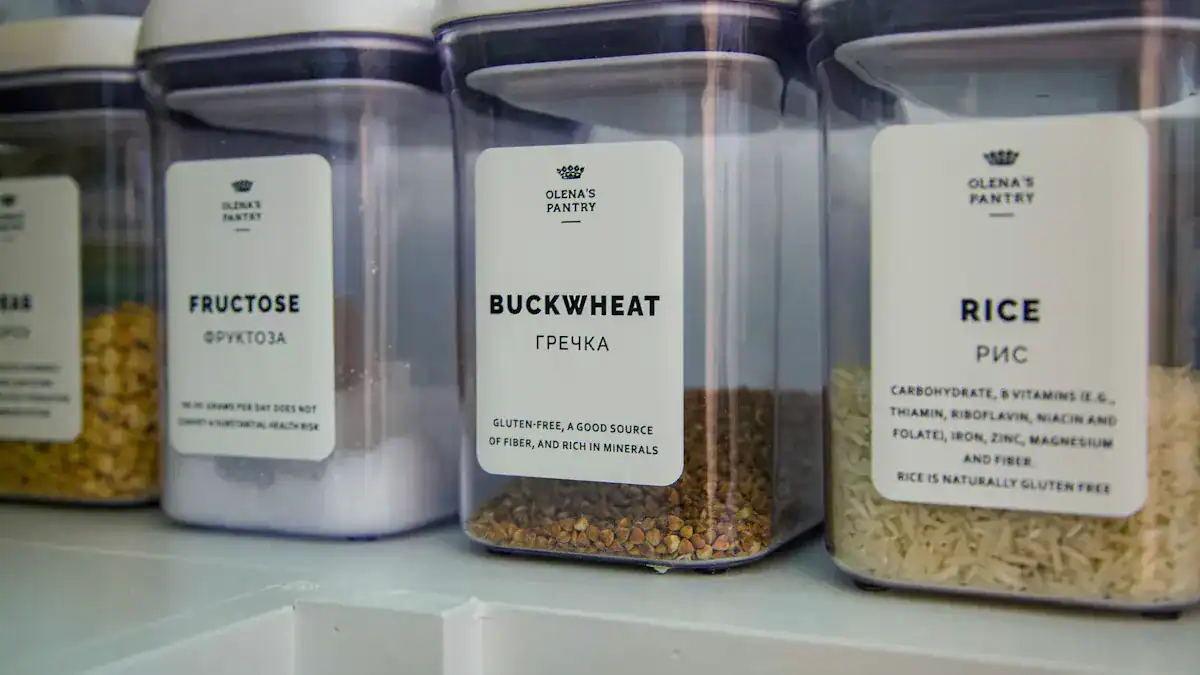
Understanding Fortified Grains
You can get folate from many natural foods. You also get it from fortified foods. Fortified foods have added nutrients. Food manufacturers add synthetic folic acid to certain grain products. This helps improve public health. Many countries around the world mandate this fortification.
Country |
|---|
United States of America |
Canada |
Brazil |
Argentina |
Mexico |
South Africa |
Australia |
And many more… |
The United States of America, for example, mandates fortification in wheat flour, maize flour, and rice. Brazil and Venezuela also fortify multiple grain types.
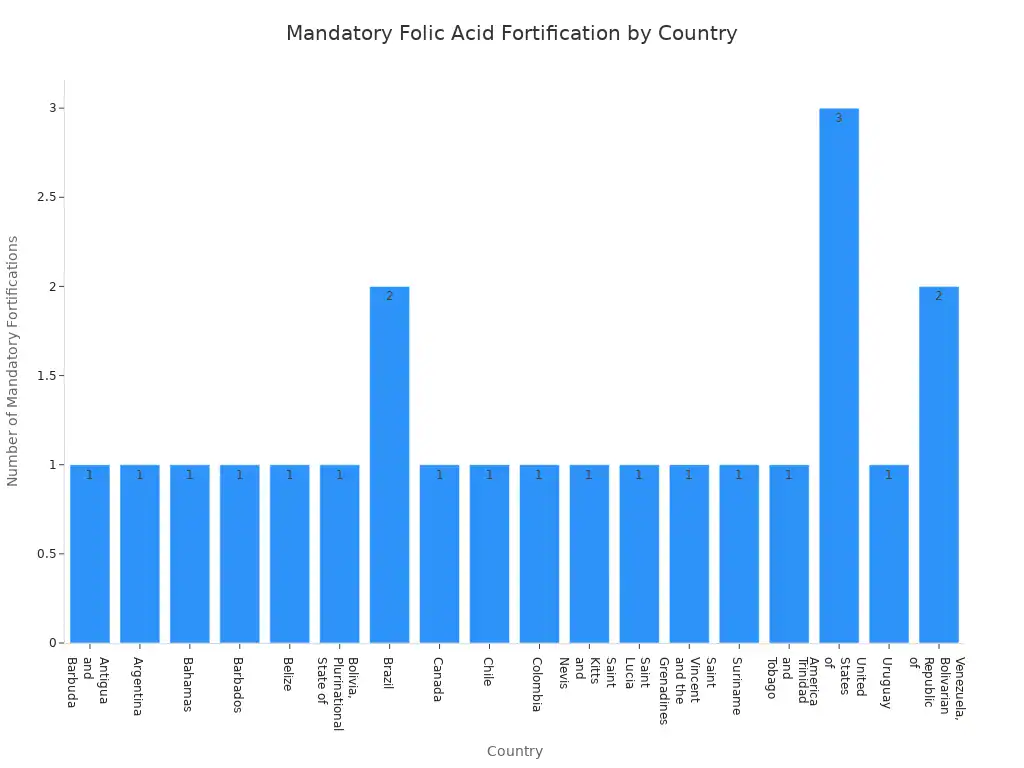
This mandatory folic acid fortification has a big impact. It helps reduce neural tube defects (NTDs). These are serious birth defects. After the U.S. started mandatory folic acid fortification in 1998, NTD prevalence dropped by 30%–40%. Grain fortification with folic acid has led to substantial reductions in NTD rates. Costa Rica saw the largest reduction. They fortify wheat flour, maize flour, cow’s milk, and rice. Other countries show NTD reductions of about 50%. This shows the power of adding folic acid to common foods.
Folic Acid In Supplements
You can also get folic acid through supplements. These supplements provide a concentrated dose of this important B vitamin. Doctors often recommend folic acid supplements for specific needs.
Category | Folic Acid Recommended Dietary Allowance (RDA) |
|---|---|
Adults 14 years and older | 400 mcg/day |
Pregnant teens and women | 600 mcg/day |
Breastfeeding teens and women | 500 mcg/day |
For most adults, the recommended daily allowance of folic acid is 400 mcg. Pregnant women need more, about 600 mcg daily. Breastfeeding women should aim for 500 mcg of folic acid. You should not take more than 1,000 mcg of folic acid daily. This is the Tolerable Upper Intake Level (UL) for adults. Always talk to your doctor before taking high doses of folic acid. High doses can sometimes hide a vitamin B12 deficiency.
Health Benefits Of Folate
Folate offers many important benefits for your body. You need this vitamin for various essential processes. Understanding these benefits helps you appreciate the role of folate and health.
Folate for Pregnant Individuals
Folate is especially vital for pregnant individuals. You need adequate folate intake during pregnancy to support both your health and your baby’s development. The recommended daily amount of folic acid for pregnant women is 600-800 mcg. Most women can meet this need through folate-rich foods and a folic acid supplement. This could be a prenatal vitamin or a separate supplement. The U.S. Preventive Services Task Force advises that all women who are planning or capable of pregnancy should take a daily supplement containing 0.4 to 0.8 mg (400 to 800 mcg) of folic acid. You should take a 400 micrograms folic acid tablet every day before pregnancy and continue until 12 weeks into pregnancy. This helps ensure you have enough folate when it matters most.
Lowering Neural Tube Defect Risk
One of the most critical roles of folate is lowering neural tube defect risk. Folate is essential for the proper development of a baby’s brain and spinal cord. These structures form early in pregnancy. Insufficient folate can lead to serious birth defects called neural tube defects. These defects include Spina Bifida, where the spinal cord and vertebrae are underdeveloped, and Anencephaly, a severe brain defect. Adequate folate intake also reduces the risk of other birth defects, such as cleft palate or lip. After folic acid fortification, the birth prevalence of spina bifida in Canada decreased by over 50%. Other neural tube defects saw a reduction of approximately one-third. Reports indicate a 50% to 70% reduction in infants born with a neural tube defect after increased maternal folic acid intake. This highlights the profound impact of folate and neural tube defects prevention.
Cardiovascular Health Support
Folate plays a role in your heart health. It helps regulate homocysteine levels in your blood. High levels of homocysteine can harm your heart. Folic acid therapy is a key strategy for lowering total homocysteine levels. Studies show that folate supplementation leads to a 25% decrease in serum homocysteine levels. This reduction is more noticeable with higher pretreatment homocysteine levels. Folate is also crucial for one-carbon metabolism. This process is essential for immune responses, mitochondrial metabolism, and antioxidant activity. However, research on folate and heart disease is complex. Some studies show no significant relationship between dietary folate intake and cardiovascular disease (CVD). Other studies suggest a lower risk of coronary heart disease with high dietary folate intake. Conversely, some research indicates that high folate levels may worsen the progression of CVD. For example, studies show elevated red blood cell folate levels increased CVD and all-cause mortality in individuals with a history of CVD. You should discuss your folate intake with your doctor, especially if you have heart concerns.
Cognitive Function And Mood
Folate is important for your cognitive function and mood. Your brain needs folate for optimal performance. Folate nutrition links to cognitive function test scores for intelligence, memory, attention, and problem-solving. Improved folate nutrition may prevent or reverse some age-related cognitive decline. Low folate status associates with the onset and progression of cognitive disorders. These include mild cognitive impairment, dementia, and depression in older individuals. Folate is crucial for synthesizing neurotransmitters like serotonin, norepinephrine, and dopamine. These chemicals regulate your mood. Low folate levels often link to clinical depression. Folate supplementation can increase levels of these neurotransmitters. This suggests folate can alleviate depressive symptoms.
Red Blood Cell Formation
Folate is essential for forming healthy red blood cells. These cells carry oxygen throughout your body. Folate is vital for the proliferation of erythroblasts during their differentiation. This is a key step in red blood cell maturation. It is required for DNA synthesis. A folate deficiency impairs DNA synthesis. This can lead to erythroblast apoptosis, resulting in a lack of red blood cells. A lack of folate causes your bone marrow to produce abnormally large red blood cells called megaloblasts. Megaloblasts often fail to enter your bloodstream. They also have a shorter lifespan than healthy red blood cells. This leads to a reduced red blood cell count and anemia.
Folate Deficiency: Symptoms And Risks
Recognizing Deficiency Signs
You might not notice folate deficiency symptoms right away. Initial signs of deficiency can appear slowly. You might feel very tired or irritable. Dizziness is another common feeling. More severe folate deficiency symptoms can include changes in your tongue. It might become red and sore. You could also notice mouth sores or ulcers. Your sense of taste might lessen. Other folate deficiency symptoms include:
Extreme tiredness (fatigue)
Paleness
Shortness of breath
Memory loss
Difficulty concentrating
Confusion
Problems with judgment
Lack of energy
Muscle weakness
Depression
Weight loss
Diarrhea
These signs of deficiency show your body needs more folate.
Who Is At Risk
Certain conditions increase your risk of folate deficiency. You might be at higher risk if you have specific medical issues. These conditions make it harder for your body to absorb or use folate.
Coeliac disease
Congestive heart failure
Acute liver damage
Long-term dialysis
Cancer
Sickle cell anaemia
Infections or health conditions causing inflammation
These situations can lead to a deficiency even if you eat enough folate.
Health Consequences
Untreated folate deficiency can cause serious health problems. One major consequence is anemia. This is called folate deficiency anemia. Your body makes large, poorly formed red blood cells. These cells do not work well. For pregnant individuals, folate deficiency is very dangerous. It can cause neural tube defects in the baby. These include spina bifida and anencephaly. These are severe birth defects.
A long-term deficiency can also affect your brain. It can lead to problems with memory and thinking. This might increase your risk for conditions like Alzheimer’s disease. Depression is also linked to low folate levels. In severe cases, untreated folate deficiency can cause permanent nervous system damage.
Folate Versus Folic Acid: The Distinction
You often hear about folate and folic acid. They are both forms of Vitamin B9. However, they are not exactly the same. Understanding the differences helps you make better choices for your health.
Natural Folate Explained
Folate is the natural form of Vitamin B9. You find folate in many foods. Your body can use this folate directly. It is a water-soluble B vitamin. Folate exists in various natural forms. These forms are often less stable. Heat and light can easily break down natural folate.
You can find natural folate in many healthy foods:
Dark green leafy vegetables (spinach, romaine lettuce, asparagus, broccoli)
Beans and legumes
Peanuts and sunflower seeds
Fresh fruits and fruit juices
Whole grains
Liver
Eggs
Here are some foods rich in natural folate:
Food Item | Folate Content (per serving) |
|---|---|
Legumes (beans, peas, lentils) | 131-358 mcg per 1 cup |
Asparagus | 134 mcg per ½ cup cooked |
Dark, leafy greens | 58-263 mcg per ½ cup cooked |
Broccoli | 84 mcg per ½ cup cooked |
Synthetic Folic Acid
Folic acid is the synthetic form of Vitamin B9. It is man-made. You find folic acid in dietary supplements. Food manufacturers also add folic acid to fortified foods. This includes many breads, cereals, and pasta. Folic acid is a fully oxidized, stable compound. You do not find folic acid naturally in foods. It is also known as monopteroylglutamic acid. This synthetic form is more stable than natural folate.
Absorption Differences
Your body processes natural folate and synthetic folic acid differently. When you eat natural folate, your small intestine processes it. Your body can use this folate quickly.
Folic acid works differently. Not all consumed folic acid converts into the active form of Vitamin B9 (5-MTHF) in your digestive system. Instead, your liver converts some folic acid to 5-MTHF. This process can be slow. It can also be inefficient for some people. This means your body might take longer to use folic acid.
Here is a quick look at the differences:
Feature | Natural Folate | Synthetic Folic Acid |
|---|---|---|
Origin | Occurs naturally in foods | Man-made, synthetic form |
Stability | Easily breaks down with heat or light | More stable in supplements and fortified foods |
Processing | Processed in the small intestine | Metabolized by the liver and other tissues |
Speed of Action | Body can use immediately | Requires conversion, slower |
Potential Risks And Considerations
Excessive Folic Acid Intake
You understand that folate is essential. However, you should know that too much folic acid can pose risks. Your body processes natural folate differently than synthetic folic acid. A very high folate intake from supplements or fortified foods can lead to problems. The tolerable upper intake level for folic acid for adults is 1,000 micrograms per day. Exceeding this limit consistently can have negative effects. For example, you might experience digestive issues. You could also have skin reactions. Always check supplement labels. You should also be mindful of your total folic acid consumption from fortified foods.
Masking B12 Deficiency
One significant concern with high folic acid intake is its ability to mask a vitamin B12 deficiency. Both folate and vitamin B12 are crucial for red blood cell production. They also support nervous system function. If you have a B12 deficiency, you might develop anemia. Folic acid supplements can correct this anemia. This makes it seem like the problem is solved. However, the underlying B12 deficiency remains. This can lead to severe and irreversible nerve damage. You might not notice this nerve damage until it is too late. Therefore, you should always rule out a B12 deficiency before taking large doses of folic acid. Your doctor can perform tests to check your B12 levels.
Medication Interactions
You should also be aware of potential medication interactions. Certain medicines can affect your folate levels. Some drugs can interfere with folate absorption. Others can increase your body’s need for folate. For example, you might take anticonvulsant medications. These drugs, like phenytoin, can lower your folate levels. Methotrexate, a drug used for cancer and autoimmune diseases, also interferes with folate metabolism. You might also use diuretics or antacids. These can impact your folate intake. If you are on any long-term medication, you should discuss your folate needs with your healthcare provider. They can advise you on appropriate folate supplementation or dietary adjustments. This helps prevent a deficiency or other complications.
You now understand that folate, or Vitamin B9, is vital for many bodily functions. It supports cell growth and overall health. You can find many natural sources of folate, including foods high in folate like leafy greens and legumes. These sources offer great benefits. Adequate folate intake is crucial, especially during pregnancy, to prevent birth defects. It also supports your heart health and cognitive function. Remember, a balanced diet ensures optimal folate intake. Be mindful of the differences between natural folate and synthetic folic acid. Your folate intake impacts your heart. Always consult healthcare professionals for personalized advice on folate or any concerns about folic acid supplementation.
FAQ
What is folate?
Folate is Vitamin B9. You need this essential nutrient for cell growth and DNA synthesis. It helps your body make new cells every day. You find folate naturally in many foods.
What foods are high in folate?
Many foods contain folate. You can find folate in dark leafy greens like spinach, legumes, beans, and citrus fruits. Nuts, seeds, and liver also provide folate.
What happens if you do not get enough folate?
If you lack folate, you can develop a deficiency. This may cause tiredness, weakness, and mouth sores. Pregnant individuals need enough folate to prevent birth defects.
What is the difference between folate and folic acid?
Folate is the natural form of Vitamin B9 found in foods. Folic acid is the synthetic form. Manufacturers add folic acid to supplements and fortified foods. Your body processes folate differently.
What are the main benefits of folate?
Folate offers many benefits. It supports healthy cell division and DNA repair. Folate is crucial for preventing neural tube defects in babies. It also helps your heart and brain function well.


